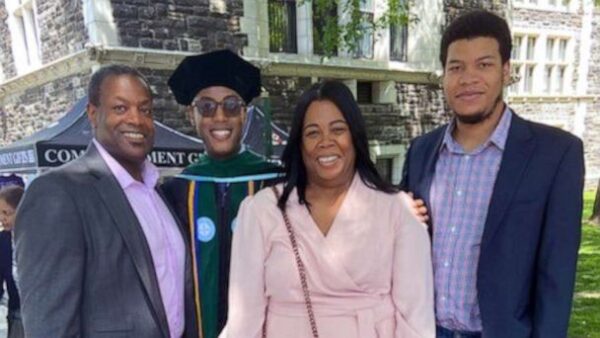A young man whose parents were told because he was born too early and weighed around 2.2 pounds at birth he might be legally blind or have developmental delays, has graduated with a doctorate in medicine. Now the New Yorker has dedicated his life to serving in the neonatal intensive care unit, helping babies the way doctors helped him.

During an interview with “Good Morning America,” Marcus Mosley, and his mother Pauline Mosley talked about his journey from a preemie (with a slim survival projection) to a graduate from the CUNY School of Medicine at City College of New York.
The 27-year journey, which culminated at a commencement ceremony on Thursday, May 26, not only brought the family full circle — with the new doctor planning to specialize in infant care — but proved medical professionals wrong.
“It was very frightening when he was born and they told me that he was in the NICU,” Pauline, now 57, recalled. “The doctors told me, they just kept giving me all these different percentages of very slim chance of him being normal, like less than 10 percent chance. They kept saying 90 percent, he might not be able to see. Eighty to 90 percent, he would have developmental delays. They didn’t know.”
A 30-year-old mom, she was shocked and scared when her son was born in December of 1995 at Westchester Medical Center in Valhalla, New York, at 26 weeks of gestation. A typical pregnancy, according to the American Pregnancy Association, can end between the 38th and 42nd weeks. Normally at the culmination of the third trimester, the infant’s organs and body parts are fully formed. Mosley was born at the very beginning of his mother’s third trimester.
While as a fetus his air sacs in his lungs had just started to form, his brain had started to develop, and his nervous system was developed enough that he could control only some of his bodily functions, he was still so underdeveloped he needed medical assistance to survive.
The staff at Westchester Medical Center did support the family — and did not stop after the young mother was released, playing an integral role in his life all through medical school.
When Mosely was 13, his mother brought him back to the hospital and introduced him to Dr. Edmund LaGamma, the chief of neonatology at Maria Fareri Children’s Hospital at WMC.
Impressed by his vocation, Mosely latched onto LaGamma as a mentor.
The doctor remembered the initiative the teenager had, saying, “He had called and said that he was a former patient of the Regional Neonatal Intensive Care Center and he was in high school and wanted to know if he could do a shadowing program over the summer.”
Mosley’s level of proactivity and commitment made him attractive as an aspiring intern.
The doctor said, “The more we spoke, the more I realized that although he was a patient … that was a particularly important era when a lot of advances had been made. So, I said, ‘Oh, great. Yes. Why don’t you come and join us on rounds and that’ll be kind of an interesting experience for you to see what you were like when you were 1,000 grams.”
The young man recalls that season.
“I was looking for research opportunities and I contacted him and that’s when I then began to shadow in the NICU,” he said. “That is what really piqued my interest and then solidified my interest in wanting to go into medicine.”
LaGamma, who also graduated from City College, took Mosley as a mentee, guiding him as he matriculated through the accelerated B.S./M.D. program.
Studying neonatal studies is not all that Mosley has researched. As a Rudin Fellow, some of his research was published in “Medical Education.”
According to SAGE Publishing, his work “examined the presentation of race in the medical curricula and how its construction influences students’ beliefs, attitudes, and conceptualization of race.” He also received a master’s in Narrative Medicine from Columbia University.
So outstanding a scholar, Mosley became the first recipient of the James McCune Smith, MD Medical Student Award, an honor that salutes the legacy of James McCune Smith, the first African-American medical doctor in the United States, his alma mater reports.
Mosley will now be working in a pediatrics residency at New York-Presbyterian Morgan Stanley Children’s Hospital.
“I’m really excited and looking forward to starting residency and to be able to take care of patients now,” Mosley said. “I’ll be responsible for patients and involved in patient care and treating families.”
The mentor believes Mosley will be a great doctor, “I think he has that personality which comes across as engaging and inviting so that he’ll do well as a pediatrician.”
“I joke with him that I’ll be interviewing him in a couple of years for his fellowship position here in Westchester and he thought that was a good idea,” LaGamma said.


